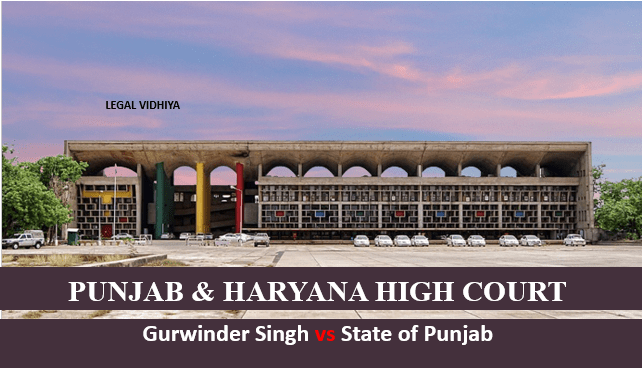
| CITATION | CRM-M-39348-2021 |
| DATE OF JUDGEMENT | 27/09/2022 |
| COURT | PUNJAB & HARYANA HIGH COURT |
| PETITIONER | GURWINDER SINGH |
| RESPONDENT | STATE OF PUNJAB |
| BENCH | HON’BLE MR. JUSTICE ANOOP CHITKARA |
INTRODUCTION
The case was brought before the High Court of Punjab and Haryana in Chandigarh by Gurwinder Singh, the Petitioner whereas the State of Punjab as Respondent. Under Section 439 of the Code of Criminal Procedure, 1973 (CrPC), the Petitioner requested bail in relation to FIR no. 410, which was registered at Rajpura Police Station in Patiala on December 14, 2018.
FACTS OF THE CASE
- In this case Gurwinder Singh is the petitioner and the State of Punjab is the respondent.
- That the petitioner had a criminal history as multiple FIRs lodged against him for offences such as under section 420, 465, 467, 468, 471 and 120-B of IPC.
- That he repeatedly mortgaged the same piece of land in order to get a loan from several banks.
- That the amount in question or the alleged amount was eighteen lakhs rupees.
- The FIR was registered at Rajpura Police Station in Patiala on December 14, 2018.
- That the petitioner filed the application for bail under section 439 of CrPC.
- The State of Punjab disputed the petitioner’s bail request, pointing to multiple FIRs that were filed against him as proof of his criminal history.
- That the custody certificate, which stated that Gurwinder Singh had been in custody since January 23, 2021.
ISSUES RAISED
- Whether the petitioner, Gurwinder Singh, is entitled to bail under section 439 of CrPC or not?
- Whether the petitioner’s prolonged pre-trial custody is a compelling factor for granting bail or not, and how it balances against the gravity of the alleged offences.
CONTENTIONS OF PETITIONER
The petitioner requested bail and was also concerned about being imprisoned for an extended period of time prior to trial.
Pretrial detention, according to the petitioner and his counsel, Mr. Mohit Makkar, would irrevocably injure the petitioner and his family.
CONTENTION OF RESPONDENT
However, the State, represented by Punjab’s Deputy Advocate General, Mr. H.S. Sitta, objected to the bail, citing the accused’s past background as evidence of his propensity for criminal activity.
The state also contended that the accused is likely to indulge in criminal activities if released on bail.
JUDGEMENT
Despite noting prior court rulings, Justice Anoop Chitkara acknowledged the petitioner’s criminal past but underlined the need of considering the accused’s involvement in the case at hand. The court emphasised the significance of giving each bail petition careful attention by citing instances such as Maulana Mohd Amir Rashadi v. State of U.P. in which the court understood that having a criminal record does not automatically exclude someone out of office if they are a member of parliament. The need of evaluating the accused’s involvement in each case and taking into account potential escape routes was emphasised.
In the case of Paramjeet Singh v. State of Punjab, the courts were cautioned to use caution when granting bail to those who had a criminal record. The emphasis was on adding only convictions to the criminal records and leaving out withdrawals, acquittals, and cases where FIRs were dismissed.
The court granted bail with certain terms and conditions like a personal bond, surety or at the option of fixed deposite, after taking into account the petitioner’s lengthy pre-trial detention, which began on January 23, 2021. Justice Chitkara used Gurbaksh Singh Sibbia v. State of Punjab and other pertinent bail-related legal precedents to support this ruling. The accused was granted flexibility by the court, which highlighted their discretionary option to select between surety bonds and fixed deposits.
ANALYSIS
After conducting a thorough study, the court struck a balance between the petitioner’s right to bail and the possible risks associated with his criminal background. In order to protect the complainant’s and the bank’s interests, guarantee the accused’s compliance, and stop any misuse of bail, it imposed strict but fair requirements. The fact that the court acknowledged the extended custody period shows that is cognizant of the idea that in some cases, justice denied can result from a delay in its administration. The petitioner’s entitlement to a prompt trial and the possible effects of a protracted detention time on the general fairness of the legal processes may have been taken into consideration by the court.
CONCLUSION
Ultimately, the court dismissed any pending applications by granting the petition under the condition that the petitioner must disclose bank accounts, fixed deposites, and other financial details within fifteen days. The ruling addressed concerns expressed by both parties and emphasised the delicate balance that must be struck between the accused’s right to liberty and the need for a fair trial.
REFERENCES
https://indiankanoon.org/doc/89688980/
This article is written by Ankita Maurya student of Graphic Era Hill University, Dehradun; Intern at Legal Vidhya.
Disclaimer: The materials provided herein are intended solely for informational purposes. Accessing or using the site or the materials does not establish an attorney-client relationship. The information presented on this site is not to be construed as legal or professional advice, and it should not be relied upon for such purposes or used as a substitute for advice from a licensed attorney in your state. Additionally, the viewpoint presented by the author is of a personal nature.




0 Comments